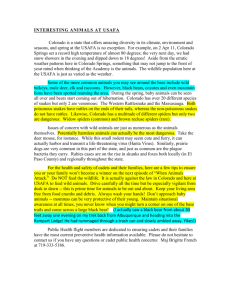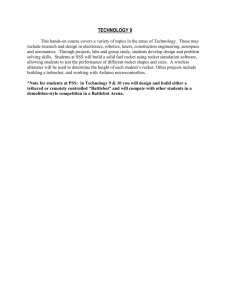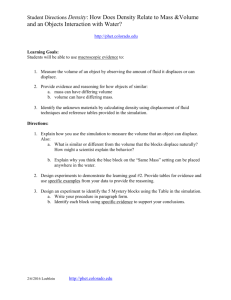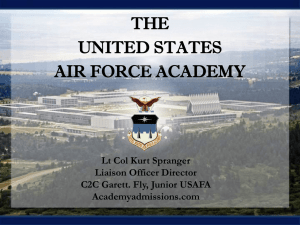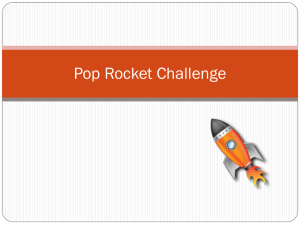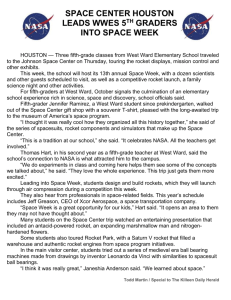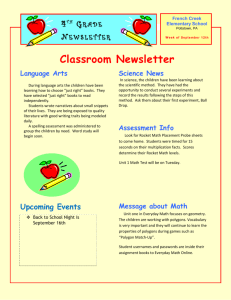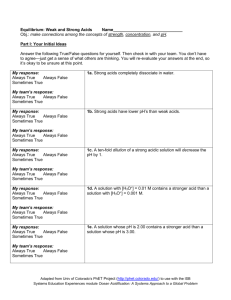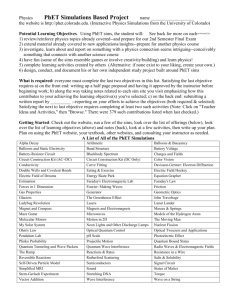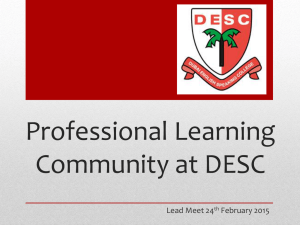here
advertisement
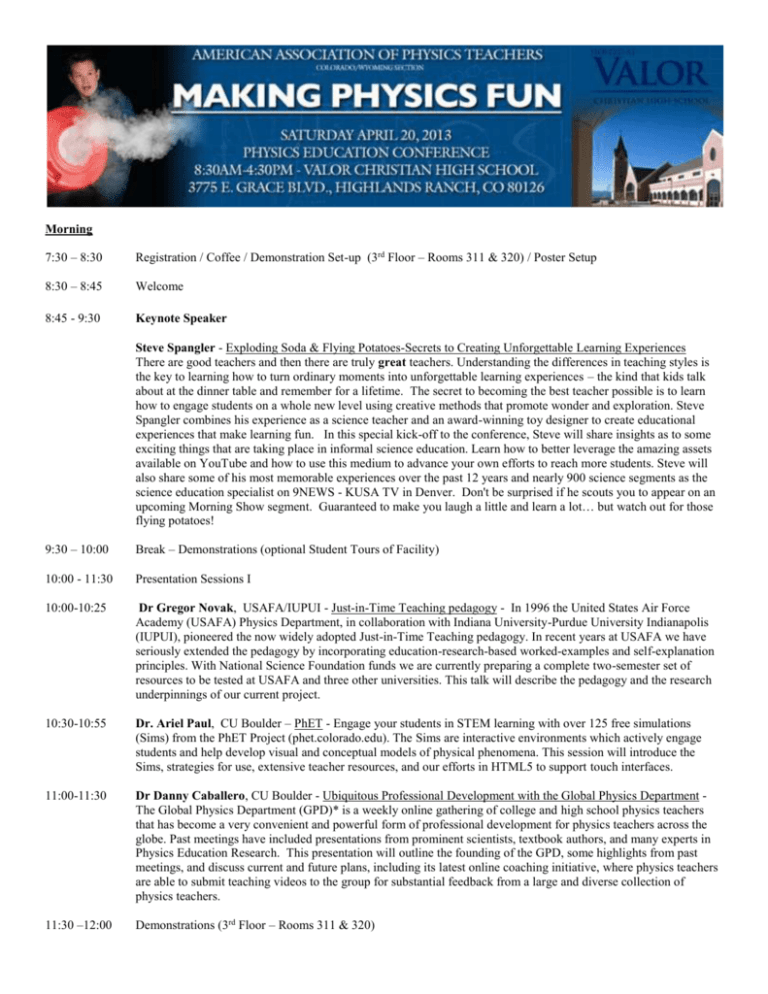
Morning 7:30 – 8:30 Registration / Coffee / Demonstration Set-up (3rd Floor – Rooms 311 & 320) / Poster Setup 8:30 – 8:45 Welcome 8:45 - 9:30 Keynote Speaker Steve Spangler - Exploding Soda & Flying Potatoes-Secrets to Creating Unforgettable Learning Experiences There are good teachers and then there are truly great teachers. Understanding the differences in teaching styles is the key to learning how to turn ordinary moments into unforgettable learning experiences – the kind that kids talk about at the dinner table and remember for a lifetime. The secret to becoming the best teacher possible is to learn how to engage students on a whole new level using creative methods that promote wonder and exploration. Steve Spangler combines his experience as a science teacher and an award-winning toy designer to create educational experiences that make learning fun. In this special kick-off to the conference, Steve will share insights as to some exciting things that are taking place in informal science education. Learn how to better leverage the amazing assets available on YouTube and how to use this medium to advance your own efforts to reach more students. Steve will also share some of his most memorable experiences over the past 12 years and nearly 900 science segments as the science education specialist on 9NEWS - KUSA TV in Denver. Don't be surprised if he scouts you to appear on an upcoming Morning Show segment. Guaranteed to make you laugh a little and learn a lot… but watch out for those flying potatoes! 9:30 – 10:00 Break – Demonstrations (optional Student Tours of Facility) 10:00 - 11:30 Presentation Sessions I 10:00-10:25 Dr Gregor Novak, USAFA/IUPUI - Just-in-Time Teaching pedagogy - In 1996 the United States Air Force Academy (USAFA) Physics Department, in collaboration with Indiana University-Purdue University Indianapolis (IUPUI), pioneered the now widely adopted Just-in-Time Teaching pedagogy. In recent years at USAFA we have seriously extended the pedagogy by incorporating education-research-based worked-examples and self-explanation principles. With National Science Foundation funds we are currently preparing a complete two-semester set of resources to be tested at USAFA and three other universities. This talk will describe the pedagogy and the research underpinnings of our current project. 10:30-10:55 Dr. Ariel Paul, CU Boulder – PhET - Engage your students in STEM learning with over 125 free simulations (Sims) from the PhET Project (phet.colorado.edu). The Sims are interactive environments which actively engage students and help develop visual and conceptual models of physical phenomena. This session will introduce the Sims, strategies for use, extensive teacher resources, and our efforts in HTML5 to support touch interfaces. 11:00-11:30 Dr Danny Caballero, CU Boulder - Ubiquitous Professional Development with the Global Physics Department The Global Physics Department (GPD)* is a weekly online gathering of college and high school physics teachers that has become a very convenient and powerful form of professional development for physics teachers across the globe. Past meetings have included presentations from prominent scientists, textbook authors, and many experts in Physics Education Research. This presentation will outline the founding of the GPD, some highlights from past meetings, and discuss current and future plans, including its latest online coaching initiative, where physics teachers are able to submit teaching videos to the group for substantial feedback from a large and diverse collection of physics teachers. 11:30 –12:00 Demonstrations (3rd Floor – Rooms 311 & 320) Afternoon 12:00 - 1:00 Lunch 1:00 – 1:30 AAPT Meeting and Elections of 2013-2014 Officials 1:45 – 3:30 Presentation Session II 1:45 – 2:00 Jose Lopez, Rocky Mountain BEST Executive Director - The Boosting Engineering Science and Technology (BEST) Robotics competition was established in 1998 as a non-profit organization to promote STEM education in our nation’s schools. The mission of this organization is; “To engage, excite, and inspire students to pursue careers in engineering, science, and technology through participation in a sports-like science and engineering based robotics competition.” In 2011 41 community-based sites in 16 states (including Colorado) tasked over 4000 volunteers, to run competitions between 900 schools, with 13,500 students participating. These events and equipment are provided free of charge to schools and students. 2:00-2:20 Wendy Adams, University of Northern Colorado – Productive and FUN use of lab time! - At the University of Northern Colorado the introductory physics course for non-majors has a traditional schedule with four 50 minute lecture periods and a three hour lab each week. I have struggled to make productive use of this three hour lab period –finding labs that are effective learning environments and fun at the same time has been difficult. This year it looks like we’ve found a promising combination. The first half of the three hour lab block has been converted to recitation where the students work on the Knight, Jones and Fields workbooks while the second half is devoted to the lab. The labs are guided inquiry, encourage teamwork, include choices for the students and many have actually been fun! Some of the most successful ideas have come from Brigham Young University’s teacher preparation program. In this presentation I’ll share examples of our most successful labs. 2:25 – 2:45 Stephan Graham, Arrupe Jesuit High School - Literacy in Physics - How well do our students understand physics jargon? In this workshop participants will read a short story, select relevant physics terminology and determine both a literary (read: physics) meaning and a figurative (read: non-physics) meaning to these terms. Other literature connections to physics will be presented using selected short stories and poems. 2:50-3:10 Brian Huang, Sparkfun – Using Arduino processors in the Physics Classroom – Brian works for Sparkfun which is an online retail store that sells the bits and pieces to make your physics electronics projects possible. Sparkfun makes the world of electronics more accessible to the average person and through their Department of Education, they help to educate individuals in the wonderful world of embedded electronics through a catalog of over 2,000 components and widgets. Brian will show us how Arduino processors can be used for physics lab experiments. 3:15-3:30 Tom Spicer, Valor Christian High School - Using Model Rocketry to Teach Physics – Physics can be made really fun by incorporating model rocketry into your Physics curriculum as a capstone project that covers Kinematics, Newton’s laws, Impulse, Drag, and Energy. Students are able to make classroom predictions of rocket performance, build a rocket, and then launch the rocket and compare actual results. Students are able to compare launch performance from sighting angle geometry/Trigonometry and an on-board altimeter. This lab activity can be tailored for courses that use various abilities of math to include only Algebra I, Geometry, Algebra II, and Calculus. I have also had the students build a performance model in Microsoft Excel that includes an accurate drag model for the rocket. These models have compared very well to actual launch performance data from the on-board altimeter. 3:30– 3:45 Break 3:45 – 4:30 Demonstration / Lab Award Presentations / Closing Remarks Cool Physics Applications for I-Phone, Android, and PC I-Phone/I-Pad XYZ Tools (3D Accelerometer) Sparkvue (Accelerometer) Kinematix (Physics Game) Go Skywatch Planetarium (Astronomy software) Magnoetmeter (Magnetism Sensor) Coaches Eye (Video analysis software) Android Accelogger (3D Accelerometer) Google Sky Map (Astronomy Program) PC Google Sketch-up (free CAD) Tracker (Free Video analysis tool) J-Track 3D (NASA real time data)
